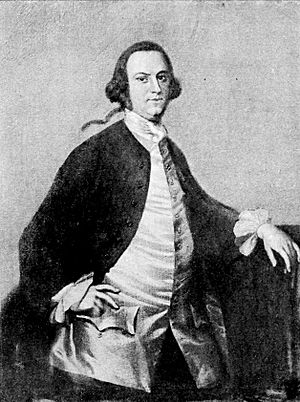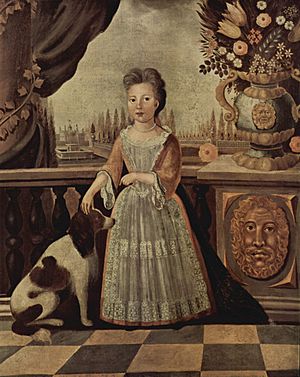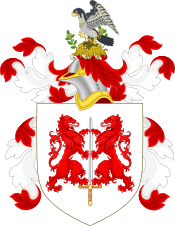Daniel Carroll facts for kids
Quick facts for kids
Daniel Carroll
|
|
|---|---|
 |
|
| Member of the U.S. House of Representatives from Maryland's 6th district |
|
| In office March 4, 1789 – March 3, 1791 |
|
| Preceded by | Office created |
| Succeeded by | Upton Sheredine |
| 3rd Commissioner of the Federal City | |
| In office March 4, 1791 – May 21, 1795 |
|
| Preceded by | Office created |
| Succeeded by | Alexander White |
| Personal details | |
| Born | July 22, 1730 Marlborough Town, Province of Maryland, British America |
| Died | May 7, 1796 (aged 65) Forest Glen, Maryland, U.S. |
| Resting place | St. John the Evangelist Catholic Church (Silver Spring, Maryland) |
| Parents |
|
| Relatives | |
| Known for | one of the Founding Fathers of the United States |
Daniel Carroll (born July 22, 1730 – died May 7, 1796) was an important American politician. He was a plantation owner from Maryland. He is known as one of the Founding Fathers of the United States. These were the leaders who helped create the United States.
Carroll strongly supported the American Revolution. He served in the Confederation Congress. He was also a delegate at the Philadelphia Convention in 1787. This meeting created the Constitution of the United States. Later, he became a U.S. Representative in the First Congress. Daniel Carroll was one of only five people to sign both the Articles of Confederation and the U.S. Constitution. He was also one of the few Roman Catholics among the Founding Fathers.
Contents
Who Was Daniel Carroll?
Early Life and Family Connections
Daniel Carroll was born on July 22, 1730. His birthplace was Marlborough Town in the Province of Maryland. His parents were wealthy plantation owners, Daniel Carroll and Eleanor Darnall Carroll. Their home, Darnall's Chance, was a large plantation. His mother inherited this land from her grandfather.
Daniel Carroll went to school in Europe. From 1742 to 1748, he studied with the Jesuits. This was at the College of St. Omer in France. This school was for English Catholics. After traveling in Europe, he returned home. He then married Eleanor Carroll, who was his cousin.
His younger brother, John Carroll, became very famous. He was the first Roman Catholic bishop in the United States. He also founded Georgetown University. Daniel's cousin, Charles Carroll of Carrollton, was also a key figure. He signed the Declaration of Independence.
Joining the Patriot Cause
In the 1770s, Daniel Carroll slowly joined the Patriot side. At first, he worried about the Revolution. He feared it might cause financial problems for his family. He also worried about mob rule.
At that time, Maryland had laws against Catholics holding public office. But when Maryland declared independence, these laws were removed. Carroll was elected to the Maryland Senate. He served there from 1777 to 1781. As a state senator, he helped gather troops and money for the American cause. His family's motto, "Strong in Faith and War," inspired his involvement.
He also worked to stop Maryland from approving the Articles of Confederation. He wanted states with western land claims to give them to Congress first. He only agreed after Virginia gave up its claims north of the Ohio River. On February 2, 1781, Maryland became the last state to approve the Articles.
Shaping the United States
The Constitutional Convention of 1787
In 1787, Daniel Carroll was chosen as a delegate from Maryland. He went to the Philadelphia Convention. This meeting was meant to fix the Articles of Confederation. Instead, it created the U.S. Constitution. Carroll believed a strong central government was needed. He thought it would help control trade between states and with other countries.
He also argued that members of Congress should not be paid by the states. He felt this would make the new government too weak. He said that if states paid them, Congress would depend too much on state governments.
Carroll and Thomas Fitzsimons were the only Roman Catholics to sign the Constitution. Their presence showed that religious freedom was growing in America. Carroll helped limit the power of the federal government. He wrote the idea that powers not given to the federal government belong to the states or the people. This idea is now in the Constitution. Carroll spoke about 20 times during the convention debates. He also served on a committee. After the convention, he worked to get the Constitution approved in Maryland.
A Career in Politics
After the convention, Carroll stayed active in politics. He played a key role in Maryland's approval of the Constitution. He defended the Constitution in the "Maryland Journal" newspaper. He argued against Anti-Federalist leaders like Samuel Chase.
After Maryland approved the Constitution, Carroll was elected. He became a representative for Maryland's Sixth Congressional District. He served in the First Congress in New York City. He cared deeply about the economy. He voted to have the federal government take on state debts from the war. This helped build trust in the new nation's finances. He also supported placing the new capital along the Potomac River.
Carroll was one of three commissioners chosen to plan the new capital. This area is now District of Columbia. He helped survey the land and buy it for the government. The United States Capitol building was built on land owned by his nephew. On April 15, 1791, he helped lay the first cornerstone for the District's boundary line. He served as a commissioner until 1795. He retired due to poor health.
He was later elected to the Maryland Senate again. He was interested in many projects in his state. This included the "Patowmack Company." This company wanted to build a canal to the West. This idea was a long-time project of George Washington. It was built before the Chesapeake and Ohio Canal.
Daniel Carroll died on May 7, 1796, at age 65. He passed away at his home near Rock Creek. He was buried in Saint John the Evangelist Catholic Church Cemetery.
Legacy
Carroll Street in Madison, Wisconsin, is named in his honor.
 | Misty Copeland |
 | Raven Wilkinson |
 | Debra Austin |
 | Aesha Ash |



